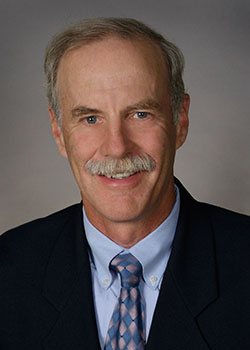Community Catalyst: Dick Salmon, MD, PhD, Cigna
“When an organization like Wheeler shifts its focus on integrated approaches to care, it’s absolutely huge...there is such a strong body of evidence of the integration of the mind and the body.”
 In 2014, soon after opening our first two Family Health & Wellness Centers, Wheeler recognized Dick Salmon, MD, PhD, at our “Evening of Wonder” gala for his commitment to building health equity in underserved communities.
In 2014, soon after opening our first two Family Health & Wellness Centers, Wheeler recognized Dick Salmon, MD, PhD, at our “Evening of Wonder” gala for his commitment to building health equity in underserved communities.
The years since have seen tremendous changes at Wheeler: the expansion to additional service areas, achieving designation as a federally qualified health center, and—most recently—the opening of the Family Health & Wellness Center on Woodland Street in Hartford, Wheeler’s flagship site for integrated primary care, behavioral health, and dental services in the capitol region.
Health care has changed, too, as the focus on providing value-based care, proven outcomes and a more integrated approach to wellness accelerates. Salmon sees Wheeler’s transformation perfectly in line with trends.

“When an organization like Wheeler shifts its focus on integrated approaches to care, it’s absolutely huge. Having a mindset of approaching behavioral health separate from physical health is an artifact, I believe, of cultural discomfort with mental health issues. I think we’re more enlightened today, and there is such a strong body of evidence of the integration of the mind and the body. It requires a different approach.”
Along with the more holistic view of care, health care providers and funders are also shifting to reimbursement strategies that are based on tangible, data-driven improvements in care for patients.
“You can’t talk about the total cost or quality of health care without understanding the role of behavioral health,” Salmon says. “So, improving the integration of behavioral health and primary care is not only the right thing to do; we know that it will also produce better results and a better quality of care for individuals. The challenge is measuring the impact and the value of that care, and I don’t mean just in one year, but trends over time. The total value is measurable health outcomes for individuals and communities.”
Salmon considers himself fortunate that, as a young family practice physician, he was exposed to behavioral health treatments and practitioners, and the exposure has shaped his view of health throughout a long and successful career.
“We all have a bias based on our practice and training. Many physicians did not have the firsthand experience with behavioral health treatment that I did, or practiced in an environment where a behavioral health clinician works side by side with primary care providers as a whole team,” he says. “It’s not about having a few more people who show up from time to time; that doesn’t get you integrated health care. It’s about having a thoughtful and proactive approach.”
This kind of approach is appealing about Wheeler in dynamic times of change, he says.
“When I look at the whole scope of services Wheeler provides, from in-home care to families in distress, to their focus on primary and integrated care, this huge spectrum and range makes a difference. And more importantly, I think Wheeler’s focus on outcomes matters a great deal, especially when it drives program development on that basis. Because of your leadership, you’ve landed in an area where the organization is doing not only what feels like the right thing to do, but doing it because the data shows IT IS the right thing to do to address overall health outcomes. I think Wheeler’s doing a great job.”





